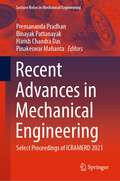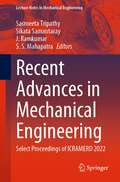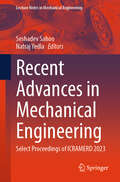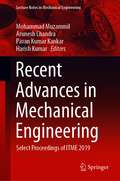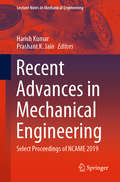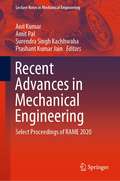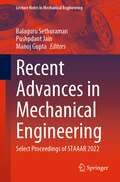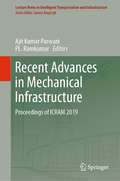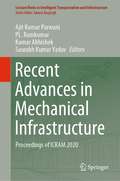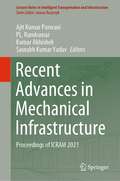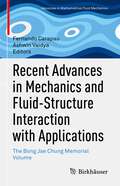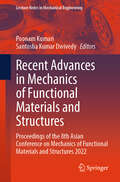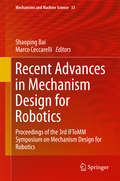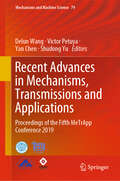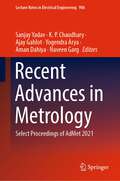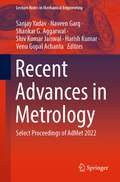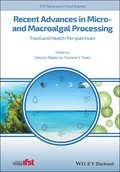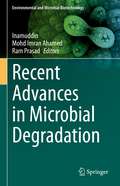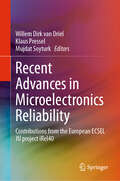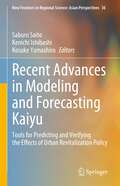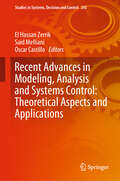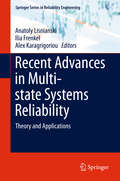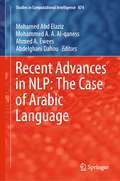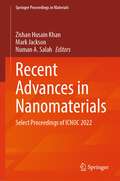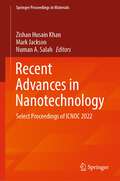- Table View
- List View
Recent Advances in Mechanical Engineering: Select Proceedings of ICRAMERD 2021 (Lecture Notes in Mechanical Engineering)
by Pinakeswar Mahanta Premananda Pradhan Binayak Pattanayak Harish Chandra DasThis book presents select proceedings of the International Conference on Recent Advances in Mechanical Engineering Research and Development (ICRAMERD 21). It covers the latest research trends in various branches of mechanical engineering. The topics covered include materials engineering, industrial system engineering, manufacturing systems engineering, automotive engineering, thermal systems, smart composite materials, manufacturing processes, industrial automation, and energy system. The book will be a valuable reference for beginners, researchers, engineers, and industry professionals working in the various fields of mechanical engineering.
Recent Advances in Mechanical Engineering: Select Proceedings of ICRAMERD 2022 (Lecture Notes in Mechanical Engineering)
by J. Ramkumar Sasmeeta Tripathy Sikata Samantaray S. S. MahapatraThis book presents select proceedings of the International Conference on Recent Advances in Mechanical Engineering Research and Development (ICRAMERD 2022) focusing on the recent advances and best practices of mechanical engineering, related technologies and sciences to meet the challenges in mechanical engineering, digital technology and smart manufacturing. The contents focus on design engineering, advanced materials, automation in engineering, industrial and systems engineering, energy and others. Some of the topics discussed here include fracture and failure analysis, fuels and alternative fuels, non-conventional machining, combustion and IC engines, advanced manufacturing technologies, powder metallurgy and rapid prototyping, industrial engineering and automation, supply chain management, design of mechanical systems, vibrations and control engineering, automobile engineering, performance analysis of biomass energy systems, heat transfer, composite materials, thermal modelling and simulations of different systems, analysis of slurry pipeline systems, waste management, optimization and robotics. The wide range of topics presented in this book will be useful for beginners, researchers as well as professionals in mechanical engineering.
Recent Advances in Mechanical Engineering: Select Proceedings of ICRAMERD 2023 (Lecture Notes in Mechanical Engineering)
by Seshadev Sahoo Natraj YedlaThis book presents select proceedings of the fourth International Conference on Recent Advances in Mechanical Engineering Research and Development (ICRAMERD 2023). The contents focus on latest research and current problems in various branches of mechanical engineering. Some of the topics discussed include fracture and failure analysis, fuels and alternative fuels, combustion and IC engines, advanced manufacturing technologies, powder metallurgy and rapid prototyping, industrial engineering and automation, vibrations and control engineering, automobile engineering, fluid mechanics and machines, heat transfer, composite materials, micro and nano-engineering for energy storage and conversion, and modeling and simulations. The book is useful for researchers and professionals in mechanical engineering.
Recent Advances in Mechanical Engineering: Select Proceedings of ITME 2019 (Lecture Notes in Mechanical Engineering)
by Harish Kumar Mohammad Muzammil Arunesh Chandra Pavan Kumar KankarThis book presents selected peer-reviewed papers presented at the International Conference on Innovative Technologies in Mechanical Engineering (ITME) 2019. The book discusses a wide range of topics in mechanical engineering such as mechanical systems, materials engineering, micro-machining, renewable energy, systems engineering, thermal engineering, additive manufacturing, automotive technologies, rapid prototyping, computer aided design and manufacturing. This book, in addition to assisting students and researchers working in various areas of mechanical engineering, can also be useful to researchers and professionals working in various allied and interdisciplinary fields.
Recent Advances in Mechanical Engineering: Select Proceedings of NCAME 2019 (Lecture Notes in Mechanical Engineering)
by Harish Kumar Prashant K. JainThis book presents the selected peer-reviewed papers from the National Conference on Advances in Mechanical Engineering (NCAME 2019), held at the National Institute of Technology Delhi, India. The book covers different areas of mechanical engineering from design engineering to manufacturing engineering. A wide range of topics are discussed such as CAD/CAM, additive manufacturing, fluid dynamics, materials science and engineering, simulation and modeling, finite element analysis, applied mechanics to name a few. The contents provide an overview of the state-of-the-art in mechanical engineering research in the country. Given the scope of the topics covered, the book will be of interest for students, researchers and professionals working in mechanical engineering.
Recent Advances in Mechanical Engineering: Select Proceedings of RAME 2020 (Lecture Notes in Mechanical Engineering)
by Anil Kumar Amit Pal Surendra Singh Kachhwaha Prashant Kumar JainThis book presents the select proceedings of the second International Conference on Recent Advances in Mechanical Engineering (RAME 2020). The topics covered include aerodynamics and fluid mechanics, automation, automotive engineering, composites, ceramics and polymers processing, computational mechanics, failure and fracture mechanics, friction, tribology and surface engineering, heating and ventilation, air conditioning system, industrial engineering, IC engines, turbomachinery and alternative fuels, machinability and formability of materials, mechanisms and machines, metrology and computer-aided inspection, micro- and nano-mechanics, modelling, simulation and optimization, product design and development, rapid manufacturing technologies and prototyping, solid mechanics and structural mechanics, thermodynamics and heat transfer, traditional and non-traditional machining processes, vibration and acoustics. The book also discusses various energy-efficient renewable and non-renewable resources and technologies, strategies and technologies for sustainable development and energy & environmental interaction. The book is a valuable reference for beginners, researchers, and professionals interested in sustainable construction and allied fields.
Recent Advances in Mechanical Engineering: Select Proceedings of STAAAR 2022 (Lecture Notes in Mechanical Engineering)
by Manoj Gupta Balaguru Sethuraman Pushpdant JainThis book consists of select proceedings of the 1st International Conference on Sustainable Technologies and Advances in Automation, Aerospace and Robotics (STAAAR 2022). This book focuses on advancements in the fields of robotics and automation, applications of AI, aerodynamics, computational fluid dynamics, material characterization, renewable energy, computer-aided engineering design, rapid prototyping, aerospace engineering, and dynamics and vibrations. The major topics in the book include Industry 4.0, applications of additive manufacturing in biomedical, automotive and aviation industries, implants and prosthesis applications in human body, applications of latest technologies such as machine learning, IoT, static and dynamic balancing, force transmissibility, advanced mechanisms, etc. This book provides vital information to researchers, academicians and industrialists to enhance their knowledge in the field of recent advancements in the field of mechanical engineering.
Recent Advances in Mechanical Infrastructure: Proceedings of ICRAM 2019 (Lecture Notes in Intelligent Transportation and Infrastructure)
by Ajit Kumar Parwani Pl. RamkumarThe book contains high quality papers presented in conference Recent Advances in Mechanical Infrastructure (ICRAM-2019) held at IITRAM, Ahmedabad, India from 20-21 April, 2019.The topics covered in this book are recent advances in thermal infrastructure, manufacturing infrastructure and infrastructure planning and design.
Recent Advances in Mechanical Infrastructure: Proceedings of ICRAM 2020 (Lecture Notes in Intelligent Transportation and Infrastructure)
by Ajit Kumar Parwani Pl. Ramkumar Kumar Abhishek Saurabh Kumar YadavThis book contains high-quality papers presented in the conference Recent Advances in Mechanical Infrastructure (ICRAM 2020) held at IITRAM, Ahmedabad, India, from 21-23 August 2020. The topics covered in this book are recent advances in thermal infrastructure, manufacturing infrastructure and infrastructure planning and design.
Recent Advances in Mechanical Infrastructure: Proceedings of ICRAM 2021 (Lecture Notes in Intelligent Transportation and Infrastructure)
by Ajit Kumar Parwani Pl. Ramkumar Kumar Abhishek Saurabh Kumar YadavThe book presents latest research-based innovations in the field of mechanical infrastructure presented in the International Conference on Recent Advances in Mechanical Infrastructure (ICRAM 2021). The broad research topics presented in this book are recent advances in thermal infrastructure: This includes aerodynamics, renewable energy, computational fluid dynamics, carbon dioxide capture and sequestration, energy and thermo-fluids, fluid dynamics, fuels and combustion, heat and mass transfer, internal combustion engine, and refrigeration and air conditioning. Recent advances in manufacturing infrastructure includes green manufacturing, instrumentation and control, material characterization, manufacturing techniques, rapid prototyping, polymers, and composites. Recent advances in infrastructure planning and design includes applied mechanics, bio-mechanics, computer-aided engineering design, finite element analysis, industrial tribology, machine design, robotics and automation, dynamics and vibration, industrial engineering, and optimization.
Recent Advances in Mechanics and Fluid-Structure Interaction with Applications: The Bong Jae Chung Memorial Volume (Advances in Mathematical Fluid Mechanics)
by Fernando Carapau Ashwin VaidyaThis volume examines current research in mechanics and its applications to various disciplines, with a particular focus on fluid-structure interaction (FSI). The topics have been chosen in commemoration of Dr. Bong Jae Chung and with respect to his wide range of research interests. This volume stands apart because of this diversity of interests, featuring an interdisciplinary and in-depth analysis of FSI that is difficult to find conveniently collected elsewhere in the literature. Contributors include mathematicians, physicists, mechanical and biomechanical engineers, and psychologists. This volume is structured into four thematic areas in order to increase its accessibility: theory, computations, experiments, and applications. Recent Advances in Mechanics and Fluid-Structure Interaction with Applications will appeal to established researchers as well as postdocs and graduate students interested in this active area of research.
Recent Advances in Mechanics of Functional Materials and Structures: Proceedings of the 8th Asian Conference on Mechanics of Functional Materials and Structures 2022 (Lecture Notes in Mechanical Engineering)
by Santosha Kumar Dwivedy Poonam KumariThis book comprises the select peer-reviewed proceedings of the 8th Asian Conference on Mechanics of Functional Materials and Structures (ACMFMS 2022). It aims to provide a comprehensive and broad-spectrum picture of the state-of-the-art research and development in diverse areas, such as contact mechanics, biomechanics and biomaterials, fracture and damage mechanics, impact mechanics and dynamic materials, structural health monitoring, and mechanics of functional and smart structures, among others. This book is a valuable resource for researchers and professionals working in academia and industry in the areas of mechanical engineering.
Recent Advances in Mechanism Design for Robotics
by Marco Ceccarelli Shaoping BaiThis volume contains the Proceedings of the 3rd IFToMM Symposium on Mechanism Design for Robotics, held in Aalborg, Denmark, 2-4 June, 2015. The book contains papers on recent advances in the design of mechanisms and their robotic applications. It treats the following topics: mechanism design, mechanics of robots, parallel manipulators, actuators and their control, linkage and industrial manipulators, innovative mechanisms/robots and their applications, among others. The book can be used by researchers and engineers in the relevant areas of mechanisms, machines and robotics.
Recent Advances in Mechanisms, Transmissions and Applications: Proceedings of the Fifth MeTrApp Conference 2019 (Mechanisms and Machine Science #79)
by Delun Wang Yan Chen Victor Petuya Shudong YuGathering the proceedings of the conference MeTrApp 2019, this book covers topics such as mechanism and machinery design, parallel manipulators, robotics and mechatronics, control applications, mechanical transmissions, cam and gear mechanisms, and dynamics of machinery. MeTrApp 2019 provided researchers, scientists, industry experts, and graduate students from around the globe with a platform to share their cutting-edge work on mechanisms, transmissions, and their applications. The proceedings extend this platform to all researchers, scientists, industry experts, and students interested in these fields.
Recent Advances in Metrology: Select Proceedings of AdMet 2021 (Lecture Notes in Electrical Engineering #906)
by Sanjay Yadav Naveen Garg K. P. Chaudhary Ajay Gahlot Yogendra Arya Aman DahiyaThis book presents the select proceedings of the 7th National Conference on Advances in Metrology (AdMet 2021) organized by Maharaja Surajmal Institute of Technology, New Delhi, India. The main theme of the conference was "Sensors and Advance Materials for Measurement and Quality Improvement". The book highlights and discusses the technological developments in the areas of sensor technology, measurement, advance material for industrial application, automation and quality control. This book is aimed for all the personnel engaged in conformity assessment, quality system management, calibration and testing in all sectors of industry. The book will be a valuable reference for metrologists, scientists, engineers, academicians and students from research institutes and industrial establishments to explore the future directions in the areas of sensors, advance materials, measurement and quality improvement.
Recent Advances in Metrology: Select Proceedings of AdMet 2022 (Lecture Notes in Mechanical Engineering)
by Harish Kumar Sanjay Yadav Naveen Garg Shankar G. Aggarwal Shiv Kumar Jaiswal Venu Gopal AchantaThis book presents the select proceedings of the 11th National Conference on Advances in Metrology (AdMet 2022). The book highlights and discusses the recent technological developments in the areas of fundamental and quantum metrology, physico-mechanical and electrical metrology, time and frequency metrology, materials metrology, industrial and legal metrology, digital transformation in metrology, among others. This book is aimed for those engaged in conformity assessment, quality system management, calibration, and testing in all sectors of industry. The book is a valuable reference for metrologists, scientists, engineers, academicians, and students from research institutes and industrial establishments to explore the future directions and research in the areas of sensors, advance materials, measurements, and quality improvement.
Recent Advances in Micro- and Macroalgal Processing: Food and Health Perspectives (IFST Advances in Food Science)
by Gaurav RajauriaA comprehensive review of algae as novel and sustainable sources of algal ingredients, their extraction and processing This comprehensive text that offers an in-depth exploration of the research and issues surrounding the consumption, economics, composition, processing and the health effects of algae. With contributions from an international team of experts, the book explores the application of conventional and emerging technologies for algal processing. The book includes recent developments such as drying and milling technologies along with advancements in sustainable greener techniques. The text also highlights individual groups of compounds including polysaccharides, proteins, polyphenols, carotenoids, lipids and fibres from algae. The authors provide insightful reviews of the traditional and more recent applications of algae/algal extracts in food, feed, pharmaceutical and cosmetics products. Offering a holistic view of the various applications, the book looks at the economic feasibility, market trends and considerations, and health hazards associated with algae for industrial applications. This important book: Provides a comprehensive overview of algal biomolecules and the role of emerging processing technologies Explores the potential biological and health benefits of algae and their applications in food, pharmaceuticals and cosmetic products Includes a current review of algal bioactives and processing technologies for food and ingredient manufacturers Contains contributions from leading academic and industrial experts Written for food scientists, allied researchers and professional food technologists, this book offers a guide to the novel processing and extraction techniques for exploring and harnessing the immense potential of algae.
Recent Advances in Microbial Degradation (Environmental and Microbial Biotechnology)
by Inamuddin Ram Prasad Mohd Imran AhamedMicrobes play a major role in the degradation of various pollutants. Therefore, microbes find potential application in the area of energy and environmental technology. The book provides in-depth literature on the topics of environmental and industrial importance. It is compiled to explore the application of microbe used in the degradation of aflatoxin, polymers, biomass into fuel, disinfectants, food products, xenobiotic compounds, lipids, steroids, organic pollutants, proteins, oil waste, and wastewater pollutants. This book will be of interest to teachers, researchers, scientists, and capacity builders. Also, the book serves as additional reading material for undergraduate and graduate students of microbiology and environmental sciences. National and international remediation and restoration scientists, policymakers will also find this to be a useful read.
Recent Advances in Microelectronics Reliability: Contributions from the European ECSEL JU project iRel40
by Willem Dirk van Driel Klaus Pressel Mujdat SoyturkThis book describes the latest progress in reliability analysis of microelectronic products. The content grows out of an EU project, named Intelligent Reliability 4.0 - iRel40 (see www.irel40.eu ). Different industrial sectors and topics are covered, such as electronics in automotive, rail transport, lighting and personal appliances. Several case studies and examples are discussed, which will enable readers to assess and mitigate similar failure cases. More importantly, this book tries to present methodologies and useful approaches in analyzing a failure and in relating a failure to the reliability of electronic devices.
Recent Advances in Modeling and Forecasting Kaiyu: Tools for Predicting and Verifying the Effects of Urban Revitalization Policy (New Frontiers in Regional Science: Asian Perspectives #36)
by Saburo Saito Kosuke Yamashiro Kenichi IshibashiThis book is the first comprehensive presentation of a Kaiyu Markov model with covariates and a multivariate Poisson model with competitive destinations. These two models are core techniques when the authors and colleagues conduct their Kaiyu studies. The two models are usually used to forecast the effects of specific urban redevelopment on both the number of visitors and consumer shop-around or Kaiyu movements. Their Kaiyu studies originated from the constructions of a Kaiyu Markov model and the disaggregated hierarchical decision Huff model almost simultaneously around the early 1980s. This book retrospectively reviews how these models have evolved from the start to the present state, and previews the ongoing efforts to make further extensions of these models. The extension of the Huff model started from the disaggregated hierarchical decision Huff model with shop-arounds. In retrospect, the model formulated the consumer’s simultaneous choice of destinations as a joint probability. The mechanism to determine this joint probability was a recursive conditional probability system. Now the Huff model has shifted from joint probability to multivariate frequency Poisson with competitive destinations. On the other hand, the Kaiyu Markov model started from a descriptive model. Because it cannot forecast changes in shop-arounds or consumer Kaiyu behaviors, the Kaiyu Markov model with covariates was developed in which entrance and shop-around choice probabilities are explained by the respective two logit models with covariates such as distances and shop-floor areas. The noticeable point is that it can explain consumers’ probability of quitting their shop-arounds. Thus, the model enables one to evaluate the effects of urban revitalization policy that promotes consumers’ shop-arounds or Kaiyu behaviors. Furthermore, if the Kaiyu Markov model can estimate the actual numbers of flows of consumers’ shop-arounds among shopping sites, the corresponding money flows also can be estimated as economic effects. This book discusses from scratch the evolution of all these topics. Thus this book provides the basics of the Kaiyu Markov model, a tutorial for the theory and estimation of the conditional logit model, and a chapter serving as a practical research manual for forecasting changes caused by urban development based on consumers’ Kaiyu behaviors.
Recent Advances in Modeling, Analysis and Systems Control: Theoretical Aspects and Applications (Studies in Systems, Decision and Control #243)
by Oscar Castillo Said Melliani El Hassan ZerrikThis book describes recent developments in a wide range of areas, including the modeling, analysis and control of dynamical systems, and explores related applications. The book provided a forum where researchers have shared their ideas, results on theory, and experiments in application problems. The current literature devoted to dynamical systems is quite large, and the authors’ choice for the considered topics was motivated by the following considerations. Firstly, the mathematical jargon for systems theory remains quite complex and the authors feel strongly that they have to maintain connections between the people of this research field. Secondly, dynamical systems cover a wider range of applications, including engineering, life sciences and environment. The authors consider that the book is an important contribution to the state of the art in the fuzzy and dynamical systems areas.
Recent Advances in Multi-state Systems Reliability
by Ilia Frenkel Anatoly Lisnianski Alex KaragrigoriouThis book addresses a modern topic in reliability: multi-state and continuous-state system reliability, which has been intensively developed in recent years. It offers an up-to-date overview of the latest developments in reliability theory for multi-state systems, engineering applications to a variety of technical problems, and case studies that will be of interest to reliability engineers and industrial managers. It also covers corresponding theoretical issues, as well as case studies illustrating the applications of the corresponding theoretical advances. The book is divided into two parts: Modern Mathematical Methods for Multi-state System Reliability Analysis (Part 1), and Applications and Case Studies (Part 2), which examines real-world multi-state systems. It will greatly benefit scientists and researchers working in reliability, as well as practitioners and managers with an interest in reliability and performability analysis. It can also be used as a textbook or as a supporting text for postgraduate courses in Industrial Engineering, Electrical Engineering, Mechanical Engineering, Applied Mathematics, and Operations Research.
Recent Advances in NLP: The Case of Arabic Language (Studies in Computational Intelligence #874)
by Mohamed Abd Elaziz Mohammed A. A. Al-qaness Ahmed A. Ewees Abdelghani DahouIn light of the rapid rise of new trends and applications in various natural language processing tasks, this book presents high-quality research in the field. Each chapter addresses a common challenge in a theoretical or applied aspect of intelligent natural language processing related to Arabic language. Many challenges encountered during the development of the solutions can be resolved by incorporating language technology and artificial intelligence.The topics covered include machine translation; speech recognition; morphological, syntactic, and semantic processing; information retrieval; text classification; text summarization; sentiment analysis; ontology construction; Arabizi translation; Arabic dialects; Arabic lemmatization; and building and evaluating linguistic resources.This book is a valuable reference for scientists, researchers, and students from academia and industry interested in computational linguistics and artificial intelligence, especially for Arabic linguistics and related areas.
Recent Advances in Nanomaterials: Select Proceedings of ICNOC 2022 (Springer Proceedings in Materials #27)
by Mark Jackson Zishan Husain Khan Numan A. SalahThis volume comprises the select peer-reviewed proceedings of the International Conference on Nanotechnology: Opportunities and Challenges (ICNOC22). It aims to provide a comprehensive and broad-spectrum picture of the state-of-the-art research and development in nanomaterials, nanocomposites, nanobiosensors, nanochemistry, renewable energy, nanochemistry in medicine, batteries and supercapacitors, targeted cellular therapies, among others. This volume will be useful for researchers and professionals working in nanotechnology and allied fields.
Recent Advances in Nanotechnology: Select Proceedings of ICNOC 2022 (Springer Proceedings in Materials #28)
by Mark Jackson Zishan Husain Khan Numan A. SalahThis volume comprises the select peer-reviewed proceedings of the International Conference on Nanotechnology: Opportunities and Challenges (ICNOC22). It aims to provide a comprehensive and broad-spectrum picture of the state-of-the-art research and development in nanomaterials, nanocomposites, nanobiosensors, nanochemistry, renewable energy, nanochemistry in medicine, batteries and supercapacitors, targeted cellular therapies, among others. This volume will be useful for researchers and professionals working in nanotechnology and allied fields.
